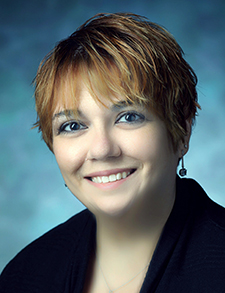
Presenters: Jennifer O’Toole, MD, MEd, SFHM, Cincinnati Children’s Hospital, Cincinnati
While there have been strides in gender equity in the practice of medicine, there’s still a long way to go, summarized Dr. O’Toole. She mentioned that, while 2017 saw the first time that more women than men matriculated into medical school, women still fall behind in leadership positions, pay, publications, and presentations. She indicated that allyship is key to fixing these gaps, a term which she defines as “a person of privilege working in solidarity and partnership with a marginalized group of people to take down systems that challenge the group’s basic rights, equal access, and ability to thrive in our society.”

Ms. Panek
Allyship requires both affirmations of the existence of the problem and informed actions to work to eliminate these issues. Dr. O’Toole stated that men hold the majority of positions of power and influence, and therefore are vital to moving gender equity forward for all women. White straight women may also hold more influence than their non-white and non-binary counterparts and therefore are also needed players in the fight for equity.
Dr. O’Toole discussed a number of practical tips for how both men and women may provide allyship and move forward with the cause of gender equity. The first is expanding one’s gender intelligence by learning to listen, pay attention, and ask questions that open your eyes to workplace patterns, behaviors, and environment. She discussed the need for allies to ask women about their experiences, and when those experiences are shared, be sure to validate and normalize those situations as true representations of those women’s reality.
It’s important for allies to understand their own privilege and use it strategically. By relinquishing power, positions, and the spotlight to women and non-binary individuals, allies are actively creating opportunities for sponsorship, which is vital. Dr. O’Toole also pointed out the importance of identifying sexist language and intervening when it is being used, not just in the case of blatant misogyny, but also when it is more subtly non-inclusive or dismissive of women. When allies see something, they must say something.
Dr. O’Toole spoke on the importance of allies in just saying no to the four “Ms”—mansplaining, manspaces, manterruptions, and manels. These entail condescending speech towards women, settings where men assume they will always be in the position of power, interruptions of women while they are speaking, and conference panels made up of only men. She also discussed the need to do away with “office housework” predominantly being assigned to women; tasks such as taking minutes, planning events, and bringing refreshments.
Dr. O’Toole indicated that organizational leadership and accountability to gender equity are the most powerful factors in change; gender and diversity initiatives should be tied to metrics for the assessment of both systems and individuals. Transparency is key, especially when it comes to pay. Hiring and salary criteria should be clear and equally applied across all genders. Organizational support for flexible work and leave policies (for all genders) in which there is no negative impact on promotion or advancement opportunities are also needed.
Key Takeaways
- Allyship is essential to closing the gender gap in medicine.
- Allyship requires both affirmations of the existence of the problem and informed actions to work to eliminate these issues.
- Allies must learn to listen closely to women’s experiences and normalize and validate them.
- Allies must actively use their privilege to eliminate practices such as sexist language, office housework, and the four Ms.
- Sponsorship by allies is a vital component in closing the gender gap.
- Organizational leadership and accountability to gender equity are the most powerful factors in change.
Ms. Panek is the division administrator, division of hospital medicine, and program coordinator, of the Bayview academic hospital medicine training program at Johns Hopkins University, Baltimore.